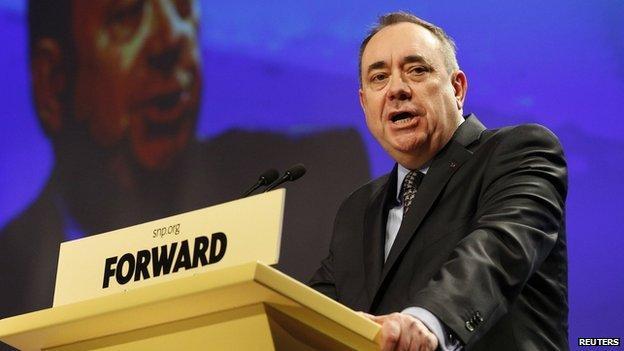Scotland's Alex Salmond woos EU
- Published
- comments

Alex Salmond says critics are unduly pessimistic about Scotland renegotiating EU membership terms
In November 2012 I was in a convention hall on the Barcelona waterfront. The crowds were arriving for a speech by Artur Mas, President of the Catalan government.
Many of them were clutching the Catalan flag. When they arrived at their seats they found an EU flag already there. It meant that, come the television news that night, the Catalan and EU flags were seen waving together.
The intended message was simple: an independent Catalonia would remain an enthusiastic member of the EU. It would continue to enjoy the benefits of the single market. (Some Catalan businessmen had started warning that they might shift their headquarters out of Barcelona if Catalonia broke away from Spain.)
So the EU flag-waving was intended to reassure voters and officials in Brussels that the European project had nothing to fear from the yearning for independence.
I was reminded of this on news that the Scottish First Minister, Alex Salmond, was coming to the Belgian city of Bruges to make his European pitch.
He carries none of the caution of most UK politicians. He is both a suitor and a seller. "Scotland's vast natural resources and human talent make it one of the lynchpins of the EU," he will tell the College of Europe., external
With an eye to fears about dependency on Russian energy he will tell his audience that "in this area Scotland is blessed". "Scotland has fully 25% of Europe's offshore wind and tidal potential."
Without Scotland, he will say, "the EU's fisheries policy would unravel".
Complex negotiations
What the first minister is hoping is that if Scotland votes to separate from the UK in September then the EU will swiftly agree to Scotland becoming an EU member - perhaps within 18 months. After all, EU law is already folded into the Scottish legal system.
He needs EU officials on his side and, like the president of the Catalan government, he needs to reassure the voters that independence will not result in a small nation adrift.
The UK Foreign Secretary, William Hague, has been quick to challenge this European pitch with some questions of his own. What are the guarantees, he asks, that Scotland would be a member of the EU within 18 months?
How would Scotland convince other member states to agree to special opt-outs from the euro or from the Schengen agreement on open borders?
There would be no Scottish "share" of the UK rebate left to claim. In 2011 the UK's rebate from the EU budget was 3.56bn euros (£3bn).
The official position of the EU is that "a nation becoming an independent state would have to reapply for EU membership". In the case of Scotland the negotiations could only start once it was clear what the financial relationship was between London and Edinburgh. I have been advised it would "not be a simple cut-and-paste job".
Adopt the euro?
It remains the case that any new member state would be obliged to join economic and monetary union. Only the UK and Denmark have an opt-out from the euro. Sweden, despite voting against joining the euro, still has an obligation to do so.
EU officials say that Article 49 is the only article or treaty that deals with the accession of new member states. All member states would have to agree to Scotland joining. And that brings us back to Spain. The government of Prime Minister Mariano Rajoy is most unlikely to smooth the path for an independent Scotland joining the EU, knowing that Catalonia is working towards holding a referendum of its own - despite the legal and constitutional obstacles.
So Alex Salmond arrives as an enthusiastic European, which no doubt will be well-received, but the path to EU membership for an independent Scotland will not be straightforward.